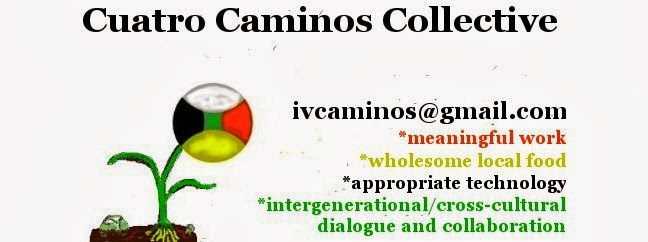Although I did grow up with a backyard, nothing in that experience prepared me for urban farming. What did help pique my interest in growing plants came from school science courses, as gardening/farming is very much an observational science, where paying attention to the details yields a wealth of information.
My volunteering activities with the Whittier Time Bank involved working with various organizations, both large and small. One group is an urban farming group, Cuatro Caminos Collective. Eddie Caesar was the lead farmer and established an urban farm at my friend Veronica's home in Whittier.
As the farm grew, the need for more volunteers grew as well. We were taught how to re-establish new top soil, with layering in compost and mulch - lasagna mulch. Bringing back the soil in this manner will allow for a long term repair of the damage done by over-watering, spraying of pesticides, erosion and plants.
I remember the first crops grown. They were blue corn, tomatoes, herbs, summer squash (crook neck, straight), eggplants, onions, and pole beans. It was a modest introduction to the process, as I followed Eddie through the fields, learning by repeating tasks.
Finally with the beginning of the fall season, Eddie and his family needed to move up north for a job offering. As no one was available to maintain Veronica's backyard farm, I was automatically volunteered to manage the plants. A quick learning curve developed after my first planting of fall crops. Many plants failed or were stunted.
I found a lot of friends in the urban gardening communities, ever ready to lend help, knowledge and encouragement.
As it turns out, this is was the beginning of WhittierBackyardFarms.com, a service business showing residents how to start an urban farm.
With a part educational and a part service plan, the aim is to inform people how to source their own food.
History has recorded numerous times of famine or drought, destroying the food crops and eventually the economic stability of continents and peoples.
These were directly related to the over tilling of the land, diverting river systems and purposeful pollution of the soil.
Good farming and land management techniques have been developed from generations of natural observation. Introduction of man-made chemicals and DNA mutations will not improve on what Mother Nature has done for millions of years.
The societies of the past were able to feed their people and prosper. Bringing in the concept of mass consumerism and marketing has made the supply inadequate.
We are told there is not enough food for us.
Industrializing the food chain has led to the long-term damage inherit with overcharging an organic system.
Being a good steward of the planet means having a long-term plan for keeping the earth healthy. Because the planet does not care if we are missing from the upper crust, this is all up to us to take care of our environment for generations to come.

No comments:
Post a Comment